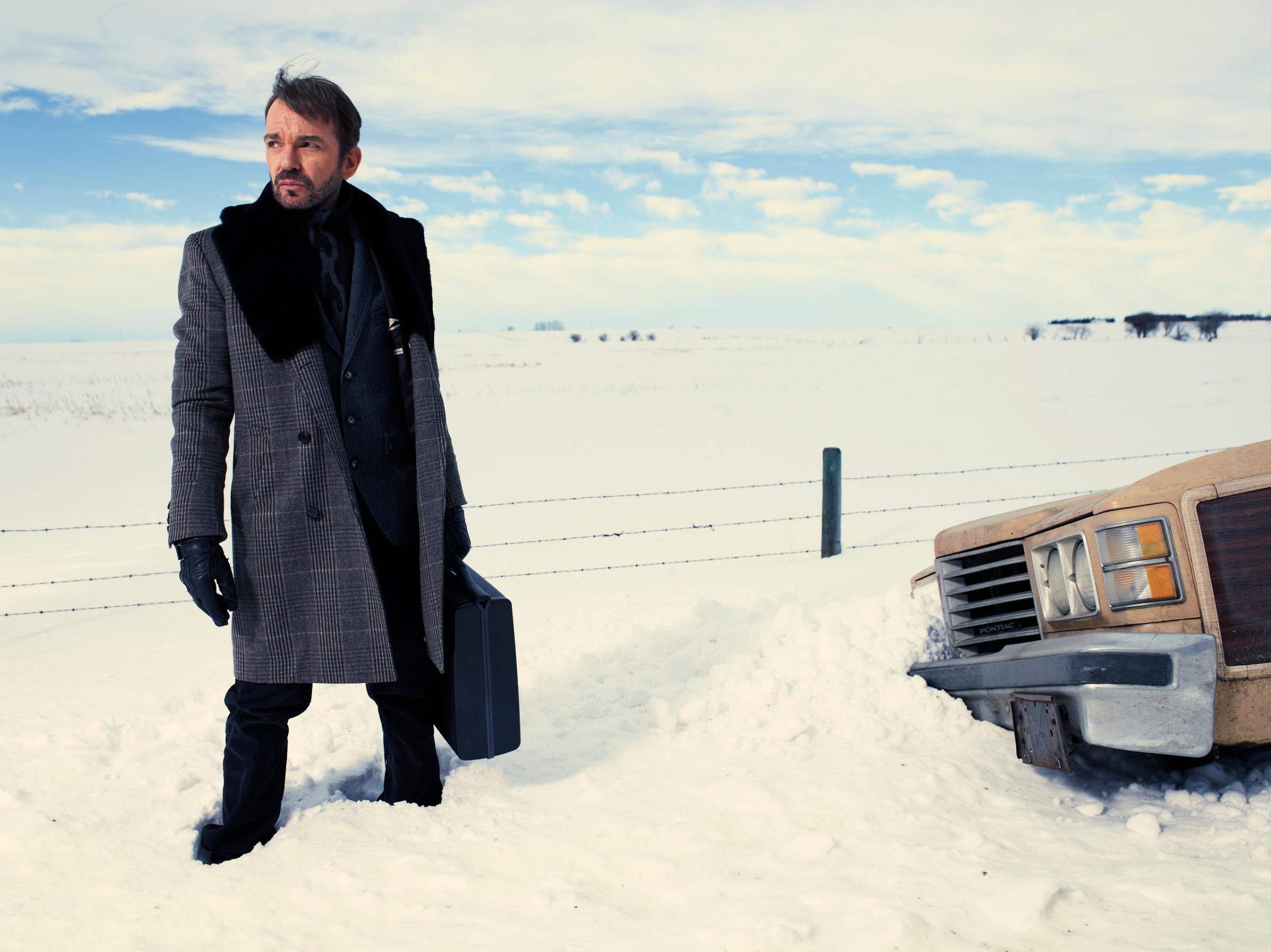As a superhero, Legion is not stronger or quippier or darker. He is, however, mentally ill. At the beginning of FX’s new show based on the Marvel character, David Haller (Downton Abbey’s Dan Stevens) has been diagnosed with schizophrenia and locked away in Clockworks Psychiatric Hospital. There, fellow patient and love interest Syd Barrett (yes, that’s her real name) helps him discover he has special abilities: telepathy and telekinesis. Are David’s delusions—a yellow-eyed devil, cutlery leaping from drawers and swirling around him—a manifestation of his illness or his powers? David doesn’t know and neither do viewers.
Legion, a fringe comic-book character, has a backstory that is seemingly impossible to translate to the screen, which is exactly why show creator Noah Hawley chose to tackle it. When FX approached the comic book fan with the idea of doing an X-Men spinoff, Hawley decided to eschew the typical “running and kicking” of other superhero series, like Netflix’s Daredevil or the CW’s Supergirl. Legion doesn’t wear a uniform or a cape. Hawley’s would be a superhero show of the mind.
True surrealism is still rare on television, though Hawley cites Twin Peaks and, more recently, Hannibal as exceptions. “I looked to the Italian film The Great Beauty a lot when I was making this. It’s a film where [the director] goes back and forth between reality and memory and dream,” he says. (That director, Paolo Sorrentino, is behind HBO’s fantastical The Young Pope.) “None of it is treated differently cinematically, so there’s no help for the audience to know when something is real and when something is surreal.”
If there is anyone who can adapt the un-adaptable, it’s Hawley. He transformed the classic, some would say perfect, Coen Brothers film Fargo into a television series that embraced the idiosyncrasies of the movie—the Minnesotan accents, the bumbling carnage—but with a completely different set of characters. The first season was nominated for 18 Emmys and won best mini-series. The show also won a Peabody.

The unexpected success of Fargo catapulted Hawley to the status of auteur. He made a second season of Fargo and is now working on a third, this one starring Ewan McGregor playing rival brothers: the “Parking Lot King of Minnesota,” and a parole officer with a chip on his shoulder. In addition to Fargo and Legion, Hawley is also adapting Kurt Vonnegut’s acerbic satire Cat’s Cradle into a series. (Legion, Fargo and Cat’s Cradle will all air on FX.)
There’s more: Hawley published his fifth novel Before the Fall, a Rashomon-style mystery that skewers a Fox News-like network, to critical raves this summer. Sony optioned the book before it even hit shelves. (He is writing the screenplay.) He’s also gearing up for his big screen directorial debut for a sci-fi movie called Man Alive. If that sounds overwhelming, it is—especially since Hawley is not a delegator. When Universal Studios recruited him to write a script for its upcoming monster movie franchise that will revive characters like the Mummy and Frankenstein, Hawley agreed before realizing he had simply did not have the time and left the project.
This success, though seemingly hitting all at once, has been some 20 years in the making. Hawley’s mother and grandmother were both writers—a playwright and a nonfiction writer, respectively—but he grew up wanting to be a rock star. In his teens, he and three other guys formed a band in New York. After college, they lived out of a van and sold home-made CDs. When he grew tired of the musician’s life, he took a paralegal job in San Francisco and wrote fiction on the side. He joined a writer’s collective whose members worked out of a converted cat-and-dog hospital.
It took Hawley three at-bats writing books before any were published. He ran two shows that didn’t last a full season. (He also spent time writing for police procedural Bones.) His pitch for Fargo, a 21-page document, attempted to capture the essence of the film: “It’s a crime story, an allegory about what happens when a civilized man puts on his mukluks and tromps out into the wilderness. It’s a dark, 3-D look at the mess he makes and the demon he brings back,” it reads. It caught the brothers’ attention and got the green light.

Hawley is one of a handful of writers—including Shonda Rhimes (Grey’s Anatomy, Scandal) and Ryan Murphy (American Horror Story, Feud)—who enjoy unprecedented creative freedom. Their slate of shows diverge in subject but share an aesthetic vocabulary. When he wrote for network television a decade ago, Hawley recalls, executives often demanded that writers “clarify” events—explain things ad nauseam rather than allow the audience to reach its own conclusion (or no conclusion at all). Hawley’s work for FX defies this.
The troubled mutant is played by Stevens, best known as the charming love interest Matthew on Downton. Hawley says he cast him in part for his romantic lead potential—“There’s a love story at the center of this show”— but also because of the wicked edge he brought to the offbeat 2014 thriller, The Guest, and the humor he coaxed out of a one-episode arc on the weed-dealer comedy series, High Maintenance. Whether Legion is a good guy or a bad guy is up for debate, but Hawley cites the moral ambiguity of the X-Men movies, which pits mutants who’ve seen the evils of humanity and want to rule them against those who want to try to peacefully cohabitate with them. “I like the idea that for Legion, his future is not set,” says Hawley. “There’s a question of which way he’ll go.”
Audiences familiar with Stevens may find the actor’s evasive mumbling and wry smile initially off-putting in Legion, but that’s partly the point. Hawley posted the term “uncanny” all over the Legion art department and reiterated it on the set of the show, borrowing the concept from the Uncanny X-Men series in which Legion appears. He cites Sigmund Freud’s essay on the uncanny and how familiar things acting in unfamiliar ways can be horrifying. “A haunted house is still the most frightening story because your house is supposed to be a place of safety. Another classic example is the girl in the Exorcist spider-walking down the stairs. We know how human beings are supposed to move, and it’s not like that.”
Watching Legion is disorienting. Aesthetically, the show is more Stanley Kubrick (a hero of Hawley’s) than Coen. The costumes, like David’s bright orange jumpsuit, are straight out of the 1970s, but the technology verges on 22nd century. Often the audience has no idea where they are in terms of time or space as the story moves through flashbacks, dreams and disconnected vignettes. “My hope is that when you watch the first hour, though it may not always be clear what every image means, and what the information is that you’re supposed to be gathering from every moment. Those answers are coming,” he says. “And so by the end of the first season, it’s going to be very clear what’s going on.”
That’s not to say that Legion is just a puzzle. Hawley’s work tends to be more tone poem than mystery. Guessing the twists, in other words, won’t ruin things. “I could tell you what happens in Fargo, but you still wouldn’t really know because that show is so much about how it happens or who it happens to.” In Legion, certain portions of the audience will guess what’s going on before others, Hawley says. “But what I love about the genre is the awe and whimsy. This isn’t an earnest, good-vs.-evil story. It’s an exercise in creativity.”
More Must-Reads From TIME
- The 100 Most Influential People of 2024
- The Revolution of Yulia Navalnaya
- 6 Compliments That Land Every Time
- What's the Deal With the Bitcoin Halving?
- If You're Dating Right Now , You're Brave: Column
- The AI That Could Heal a Divided Internet
- Fallout Is a Brilliant Model for the Future of Video Game Adaptations
- Want Weekly Recs on What to Watch, Read, and More? Sign Up for Worth Your Time
Write to Eliana Dockterman at eliana.dockterman@time.com